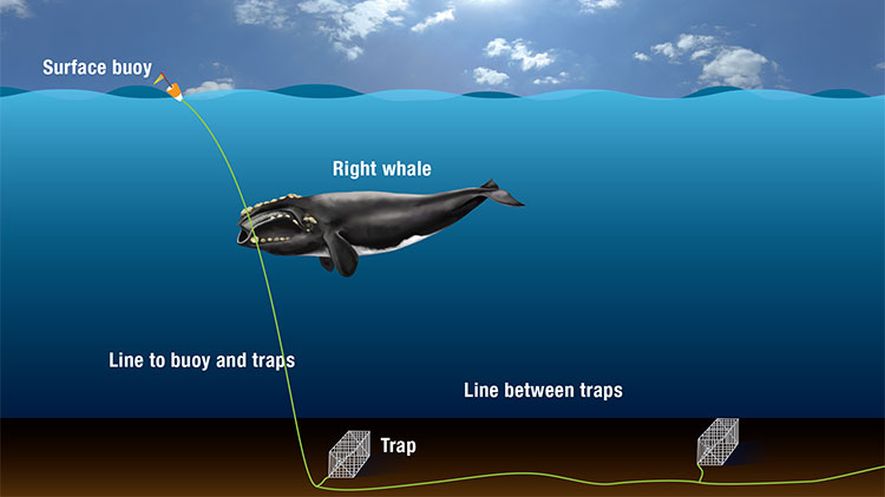Two newly published studies, one led by the New England Aquarium and the other by the Woods Hole Oceanographic Institute (WHOI) have taken a first time look at what can be done to mitigate death from entanglement.
A new study led by the New England Aquarium and published in the journal Conservation Biology has concluded that switching fishing gear to use ropes that break at 1700 pounds or less, could reduce potentially life-threatening entanglements for whales by over 70%. At the same time the ropes would still be effective for many types of fishing activities.
The study examined live and dead whales entangled in fishing gear along the U.S. East Coast and the Canadian Maritimes from 1994 to 2010, comparing the whale species, type and strength of rope involved, as well as the nature of the injuries to the whale. The authors, led by Amy R. Knowlton, work for the New England Aquarium, The Center for Coastal Studies, and Boston University.
Entanglement in fishing gear is a major threat to large whales throughout the world's oceans and is almost a weekly occurrence on the east coast of the US, home to species such as the endangered North Atlantic right whale, of which just a few hundred remain. In fact, according to the Woods Hole Oceanographic Institute (WHOI), entanglement in fishing gear is the leading cause of death for North Atlantic right whales.
According to the authors, this was the first study to investigate how rope breaking strength influences entanglement outcome. They wrote, “Ours is the first evidence-based analysis that supports a modification to fishing gear that would reduce the incidence of serious whale entanglements in fixed fish-ing gear. Past mitigation efforts for right and humpback whales were based on common sense and were never subjected to experimental evaluation before or after implementation. We found evidence that reduced breaking strength (RBS) ropes of 7.56 kN (1700 lbsf) or less could make a major contribution to whale entanglement mitigation.”
However, they added that “The use of RBS ropes would not reduce the number of encounters between whales and gear and may not prevent lethal entanglements in some areas such as the right whale calving grounds, where neonates have less strength than a minke whale.”
They recommend that RBS ropes be tested in any part of the world where whale entanglements occur in fixed fishing gear and should be considered for any rope-based marine activity.
This research ties in well with recent work by WHOI. In a paper published online in Marine Mammal Science, a research team led by WHOI quantified the amount of drag on entangled whales that is created by towing fishing gear, such as rope, buoys, and lobster and crab traps. The groundbreaking study provides important data for teams evaluating the risks and benefits of whale disentanglements.
"We know that entanglement can change a whale’s diving and swimming behavior and depletes their energy,” said Julie van der Hoop, lead author of the paper and a PhD Candidate in the MIT-WHOI Joint Program in Oceanography, “but the big thing we have never really known is what it must be like for animals to tow the gear. Is it like wearing an empty backpack or is that backpack overloaded with heavy books? Does removing part of the gear improve chances of survival? These are some of the questions that we were looking to answer with this research."



